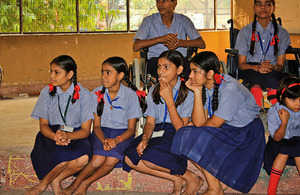DFID Research: Ensuring an education for children with disabilities
Research conducted by the Research Consortium on Educational Outcomes and Poverty has identified the issues facing disabled youth in India

Disabled and non-disabled children at school. Picture: Mester Jagels/Flickr
The education of children living in poverty often suffers, but those who are poor and disabled face even greater problems. A study by the Centre for Education and International Development (CEID), University of Cambridge, UK has identified key issues faced by the five million or so disabled people aged 12 to 24 in India. Nidhi Singal of the CEID points out that those with disabilities are less likely to be able to work, not just because of their disability, but because of the discrimination they face because of it. In the paper, Forgotten Youth: Disability and Development in India, Singal says that they also suffer at school because teachers aren’t trained to help with their needs, buildings are unsuitable, and there are low expectations. The study is part of the DFID-funded Research Consortium on Educational Outcomes and Poverty (RECOUP).
There is wildly conflicting data on the levels of participation of disabled children in education - with estimates varying from 1% to 67%. In general, disabled children that do attend school have no special provisions made. While recent government initiatives have targeted disabled children, such efforts have focused on structural issues rather reviewing the teaching and learning processes in the classroom. And while enrolments of disabled children in primary education have increased, very few complete primary school, and fewer still make it into secondary education.
The focus in India
The primary focus in India is on providing people with aids and appliances rather than addressing social barriers that result in their exclusion or non-participation from the mainstream, says Singal. However, even gaining access to aids and appliances is difficult. Disability is often seen as a punishment for sin or as worthy of pity, and while pity leads to charity, it distances any potential for disabled individuals to take responsibility for finding employment.
There is a tendency for a purely medical definition of disabilities that does not take account of the potential for the individual to live within society.
“Such a reconceptualisation of disability, though challenging, will have a significant impact on not just how we collect data but also how we respond to the needs of people with disabilities,” says Singal. “Simply put, it is not only about providing someone with a wheelchair but it is also about ensuring that there are accessible roads on which these can be used safely, and more importantly, it is about a change in societal attitudes which acknowledges the individual rather than just the wheelchair.”
What RECOUP is doing
The RECOUP consortium is examining education and poverty reduction strategies in poorer countries by applying new understanding of the educational impacts on poverty and their synergies with other dimensions of poverty reduction. It is based on the experience that simply expanding education does not always benefit the poor, and is seeking to identify priorities in education that will help investment maximize those benefits.
Additional information
-
RECOUP Working Paper 14.Forgotten Youth: Disability and Development in India.
-
RECOUP study on Disability, Education and Poverty